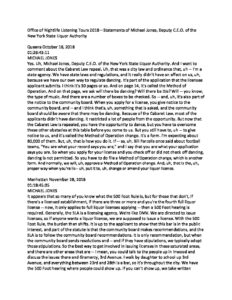Whenever a Community Board objects to a License Application, for example, to restrict dancing or live music, the SLA's practices is to require approval by the SLA Board, thereby pressuring license applicants to agrees to excessive and even unconstitutional requirements of Community Boards.
In 2018, the Office of Nightlife held Listening Tours to consider issues for its consideration. Among the panels was a representative of the State Liquor Authority.
The SLA candidly admitted at the Queens tour on October 16, 2018 that the SLA regulated dancing and music and that the repeal of the Cabaret Law was irrelevant. As stated by Michael Jones, Deputy CEO of the SLA:
“we have our own way to regulate dancing…It’s part of the application that the licensee applicant submits. I think it’s 30 pages or so. And on page 14, it’s called the Method of Operation. And on that page, we ask will there be dancing? Will there be DJs? Will — you know, the type of music. And there are a number of boxes to be checked. So — and, uh, it’s also part of the notice to the community board. When you apply for a license, you give notice to the community board, and — and I think that’s, uh, something that is asked, and the community board should be aware that there may be dancing. Because of the Cabaret Law, most of the applicants didn’t have dancing. It restricted a lot of people from the opportunity. But now that the Cabaret Law is repealed, you have the opportunity to dance, but you have to overcome these other obstacles at this table before you come to us. But you still have to, uh — to give notice to us, and it’s called the Method of Operation change. It’s a form. I’m expecting about 80,000 of them. But, uh, that is how you do it. If — as, uh, Bill Parcells once said about football teams, “You are what your record says you are,” and I say that you are what your application says you are. So when you apply for your license and you check off or did not check off dancing, dancing is not permitted. So you have to do file a Method of Operation change, which is another form. And normally, we will, uh, approve a Method of Operation change. And, uh, that is the, uh, proper way when you’re lic– uh, put it to, uh, change or amend your liquor license.
Jones’ statement may be paraphrased as follows:
“We have our own way to regulate dancing.”
“It’s called the Method of Operation.”
“We ask will there be dancing?”
“You give notice to the community board.”
“You still have to give [the SLA] a Method of Operation change form.
“I’m expecting about 80,000 (sic) of them.”
“When you apply for your license and if you did not check off dancing, dancing is not permitted.”
At the Manhattan tour, the SLA further disclosed how its practices empowered Community Boards to strong-arm applicants to concede to objections by the Community Boards:
That’s acceptable, and any time there is opposition to a license, it is sent to the SLA full board, which is the chairman and the two commissioners,
In other words, unless an applicant wishes to accept the delay in waiting for a full Board meeting and attending the meeting, it is far easier to agree to any demands, however unreasonable, of a Community Board. Perhaps this explains why 4000 venues allow recorded music, but apparently do not allow live music.
